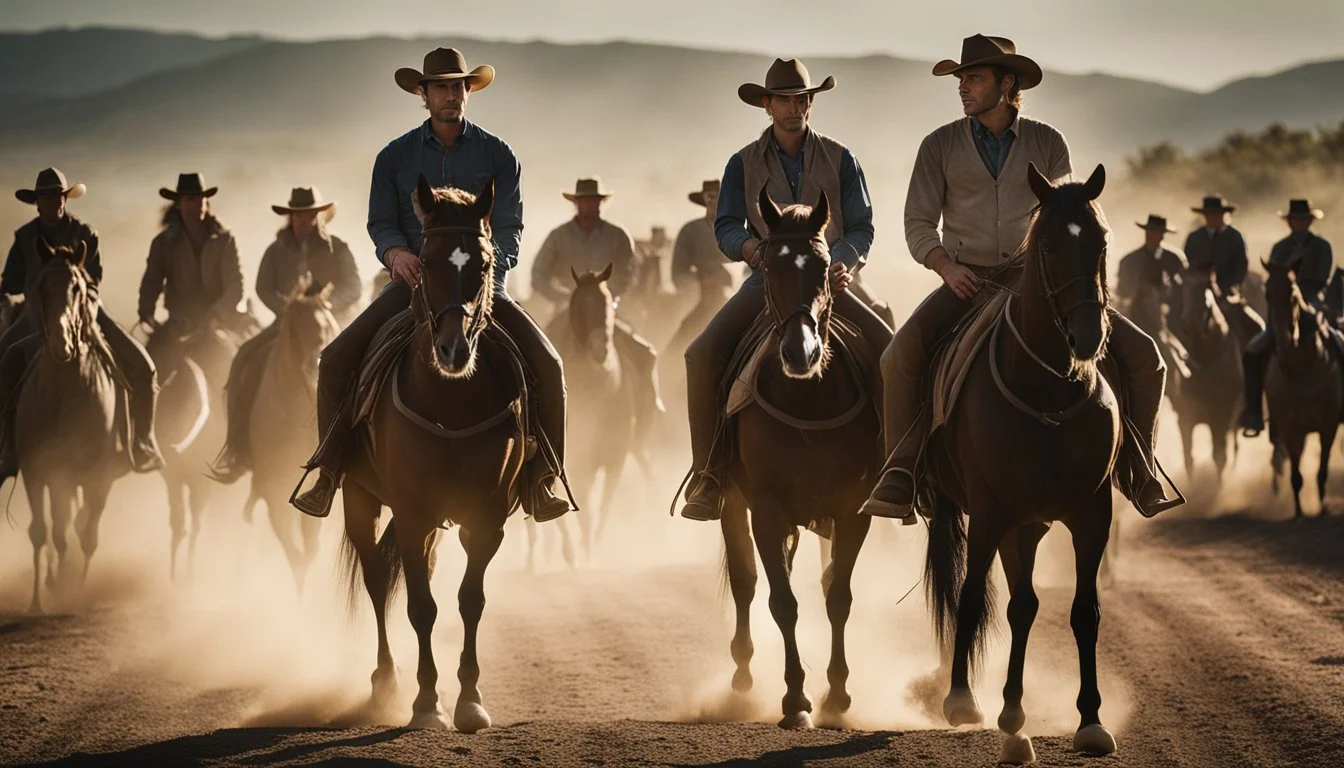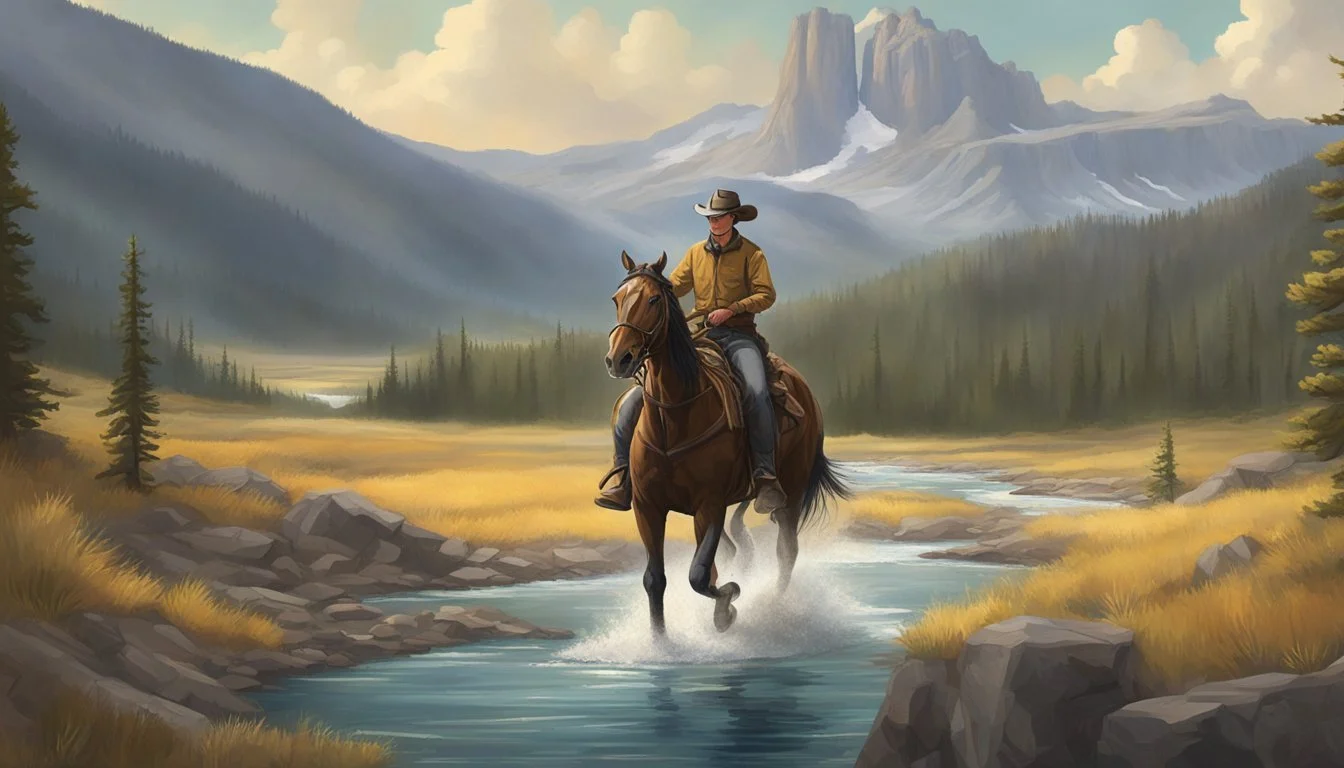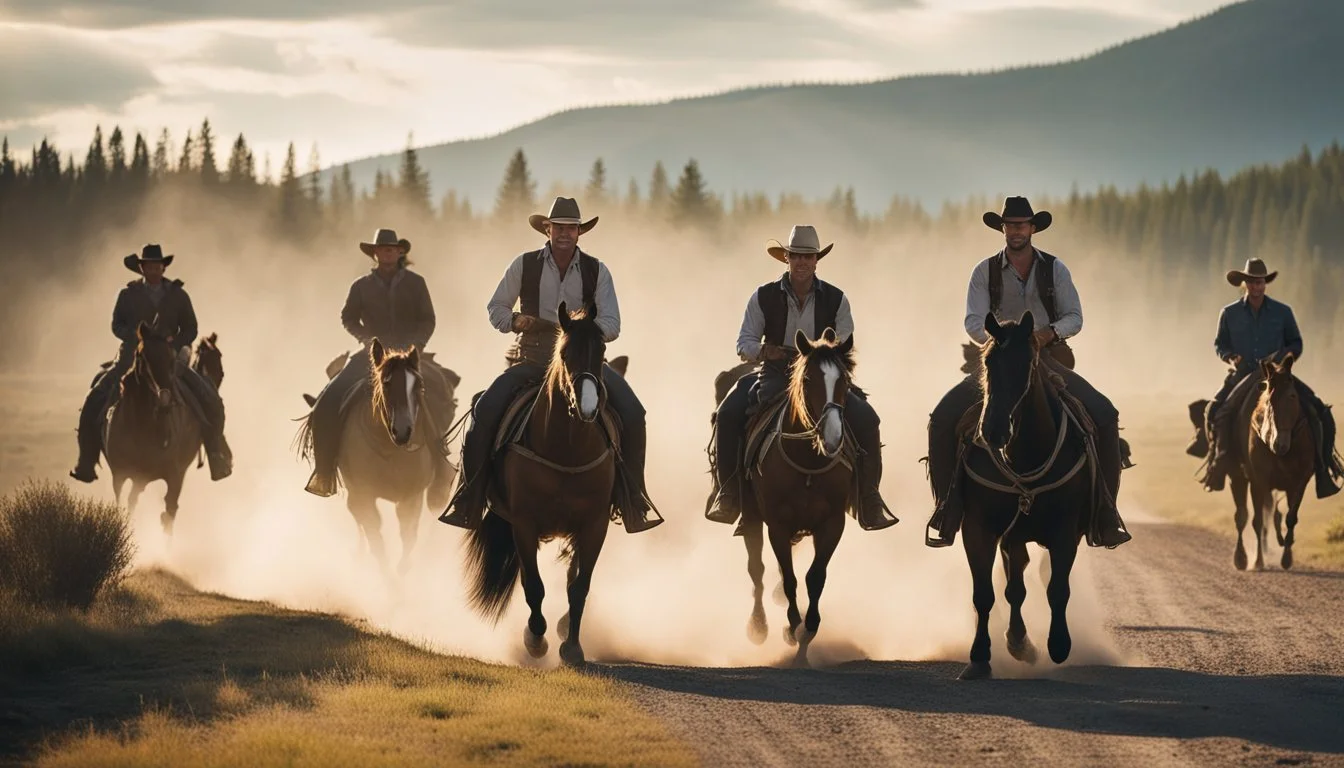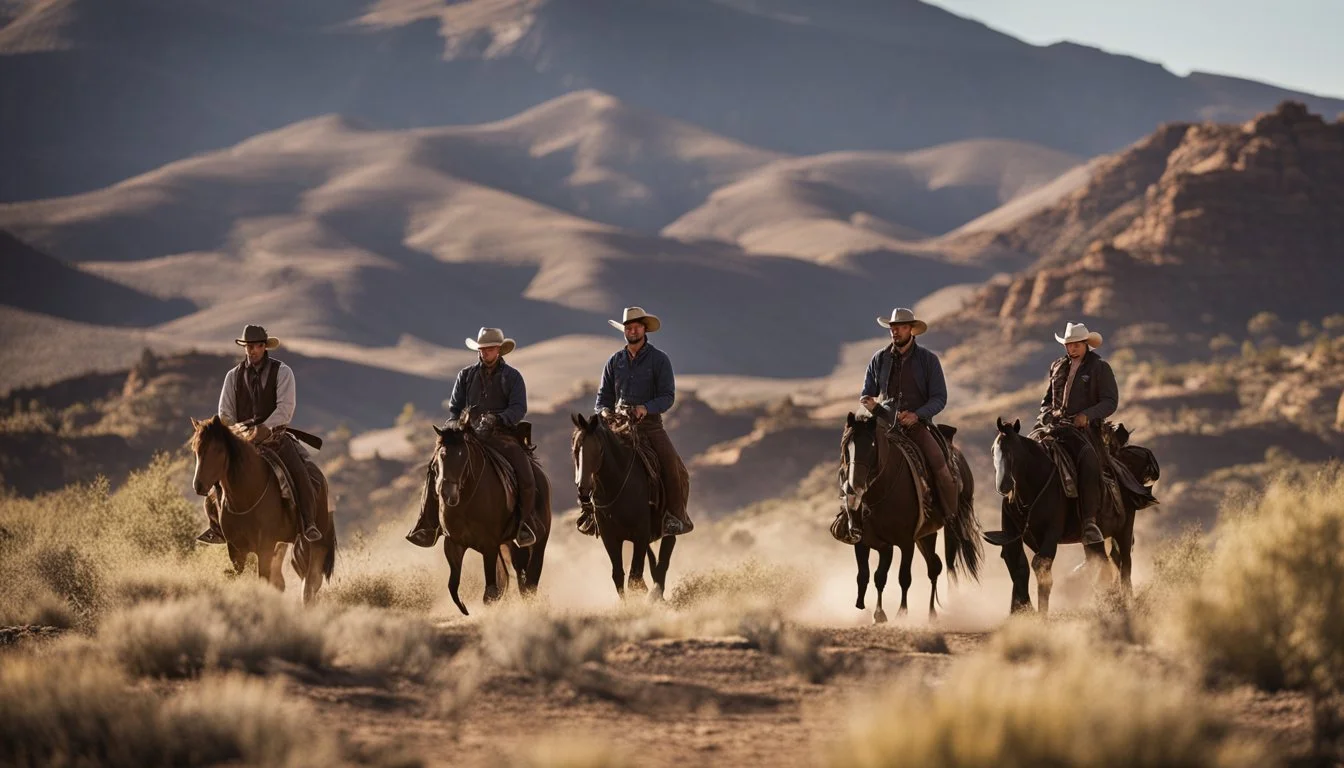Gator Takes Center Stage in Yellowstone Shocking Twist Fans Never Saw Coming
Gator, Yellowstone's unassuming ranch cook, has quietly captured the hearts of fans with his culinary skills and unique personality. As a recurring character, he's added flavor to the Dutton family's daily life at the ranch. But what if Gator stepped out of the kitchen and into the spotlight?
Elevating Gator to a central character could bring a fresh perspective to the dramatic world of Yellowstone. His behind-the-scenes role has given him a unique vantage point on the family's dynamics and secrets. As a trusted member of the household, Gator likely knows more than he lets on about the Duttons' affairs.
Expanding Gator's role might reveal unexpected layers to his character. Perhaps he has hidden talents or connections that could prove valuable in the Duttons' ongoing struggles. His increased prominence could also provide much-needed comic relief amidst the show's intense conflicts, balancing out the darker elements of the storyline.
Yellowstone Series Overview
Yellowstone has captivated audiences with its intense family drama set against the backdrop of Montana's rugged landscape. The series explores power struggles, land disputes, and the complexities of modern ranching.
The Dutton Family Legacy
The Dutton family, led by patriarch John Dutton (Kevin Costner), owns the largest contiguous ranch in the United States. Their sprawling Yellowstone Ranch faces constant threats from land developers, Native American reservations, and the national park bordering their property.
John's children play crucial roles in the family's operations. Beth, the sharp-tongued financier, fiercely protects the ranch's interests. Kayce, a former Navy SEAL, balances his loyalty between the ranch and his Native American wife's family. Jamie, the lawyer-turned-politician, navigates complex legal waters for the Duttons.
The series delves into the moral ambiguities of maintaining power and legacy in the modern West. Each family member grapples with personal demons while fighting to preserve their way of life.
Key Milestones and Plot Turns
Yellowstone's storyline is marked by intense conflicts and unexpected alliances. The Duttons face off against powerful enemies, including land developers, rival ranchers, and corrupt politicians.
Season 1 introduced the core conflicts, setting the stage for future battles. Subsequent seasons saw:
The rise of Market Equities as a major antagonist
Beth's corporate maneuvering to protect Dutton interests
Kayce's journey between two worlds: ranching and reservation life
Jamie's complex relationship with his adoptive family
The series also explores themes of loyalty, identity, and the changing face of the American West. Creator Taylor Sheridan weaves intricate plots that keep viewers on edge.
Season 5 Significance
Season 5 of Yellowstone marked a turning point for the Dutton family and their allies. John Dutton's ascension to Governor of Montana shifted the power dynamics dramatically.
This season intensified the conflict between the Duttons and Market Equities. Beth's aggressive tactics in the corporate world reached new heights, while Jamie's political ambitions clashed with family loyalty.
The ranch faced unprecedented challenges, forcing the Duttons to make difficult choices. Rip Wheeler's role as John's right-hand man became even more crucial in maintaining order.
Season 5 also set the stage for potential spin-offs, expanding the Yellowstone universe. The series' popularity led to prequels like 1923, further exploring the Dutton family history.
Character Arcs and Development
Yellowstone's main characters undergo profound transformations as they navigate power struggles, family conflicts, and personal demons. Their evolving identities and relationships drive the show's compelling narrative.
John Dutton's Struggle for Power
John Dutton, the patriarch of the Dutton family, faces constant threats to his ranch and way of life. His character arc revolves around maintaining control over his vast empire while grappling with his own mortality.
As the series progresses, John's methods become increasingly ruthless. He manipulates political figures and resorts to violence to protect his legacy.
Yet, glimpses of vulnerability emerge as he confronts his own mistakes and the toll his choices have taken on his family. John's journey highlights the complexities of power and the sacrifices required to maintain it.
Beth Dutton's Ruthlessness and Vulnerabilities
Beth Dutton's character development is a study in contrasts. Initially portrayed as a merciless corporate shark, Beth's layers of vulnerability gradually unfold throughout the series.
Her fierce loyalty to her father and the ranch drives her actions, often leading to brutal confrontations with enemies. Beth's sharp wit and strategic mind make her a formidable opponent in boardrooms and backroom deals.
However, her relationship with Rip Wheeler reveals a softer side. As their bond deepens, Beth confronts her past traumas and begins to open herself to love and trust.
Kelly Reilly's nuanced performance brings depth to Beth's complex emotional journey.
Kayce Dutton's Quest for Identity
Kayce Dutton's arc centers on his search for belonging and purpose. As a former Navy SEAL, he struggles to reconcile his military past with his role in the family business.
Torn between his loyalty to the ranch and his desire for a simpler life with his wife and son, Kayce often finds himself at a crossroads. His journey takes him from reluctant enforcer to potential heir of the Dutton empire.
Luke Grimes portrays Kayce's internal conflicts with subtlety, showcasing the character's growth from a man haunted by his past to one seeking redemption and peace.
Jamie Dutton's Betrayal and Ambition
Jamie Dutton's character arc is marked by a constant struggle between ambition and family loyalty. As the adopted son of John Dutton, Jamie's quest for approval and recognition drives many of his actions.
His legal expertise makes him a valuable asset to the ranch, but his desire for political power often puts him at odds with his family's interests. Jamie's discovery of his biological parentage further complicates his allegiances.
As the series progresses, Jamie's choices lead him down a path of betrayal and moral compromise. His relationship with the Duttons becomes increasingly strained, culminating in shocking acts that redefine his place within the family dynamic.
Rip Wheeler's Loyalty and Love
Rip Wheeler's development centers on his unwavering loyalty to the Dutton family and his evolving relationship with Beth. As the ranch's enforcer, Rip's brutal efficiency is tempered by his deep sense of honor.
Cole Hauser brings a quiet intensity to Rip, revealing the character's hidden depths. His love for Beth softens his hardened exterior, allowing glimpses of vulnerability and tenderness.
Rip's journey from orphaned ranch hand to John Dutton's most trusted ally showcases themes of found family and redemption. His steadfast dedication to the Duttons becomes a cornerstone of the ranch's survival.
The Role of Yellowstone's Antagonists
Yellowstone's antagonists drive the series forward, creating conflicts that test the Dutton family's resolve. These adversaries come from various backgrounds, each presenting unique challenges to the ranch's survival.
Thomas Rainwater's Mission
Thomas Rainwater, the shrewd leader of the Broken Rock Reservation, seeks to reclaim Dutton land for his people. His tactics range from legal maneuvers to strategic alliances. Rainwater's complex character blurs the line between antagonist and anti-hero.
He often finds himself in a delicate balance, opposing the Duttons while sometimes aligning with them against common threats. Rainwater's unwavering commitment to his tribe's interests makes him a formidable opponent.
Market Equities and the Land Battle
Market Equities emerges as a powerful corporate adversary, intent on transforming Yellowstone into a lucrative development. Their aggressive land acquisition strategies pose a significant threat to the Dutton legacy.
Sarah Atwood, a cunning Market Equities representative, employs manipulation and seduction to further the company's goals. Her presence intensifies the land battle, adding a layer of personal intrigue to the corporate conflict.
The Threat from Within: The Duttons' Own Kin
Internal family conflicts create some of Yellowstone's most compelling antagonists. Jamie Dutton's ambition and complicated relationship with his adoptive family lead to betrayal and power struggles.
Beth Dutton, while fiercely loyal to her father, becomes an antagonistic force to those who threaten the ranch. Her ruthless tactics often blur ethical lines, making her both protector and potential liability to the family's interests.
The Cultural and Sociopolitical Landscape
Yellowstone's setting in Montana provides a rich backdrop for exploring complex cultural and political dynamics. The show weaves together themes of ranching heritage, indigenous rights, and legal battles over land.
Montana's Ranching Heritage
Montana's ranching culture forms the core of Yellowstone's narrative. The Dutton family's struggle to maintain their vast cattle ranch reflects real-world challenges faced by ranchers. Economic pressures and changing land use threaten traditional ways of life.
Ranch hands play a crucial role in this world, embodying the gritty work ethic associated with cowboy culture. Their loyalty to the Dutton family highlights the tight-knit nature of ranching communities.
The show portrays the tensions between preserving ranching traditions and adapting to modern realities. This includes debates over land conservation, tourism, and development.
The Broken Rock Reservation
Yellowstone depicts the complex relationship between the Dutton ranch and the neighboring Broken Rock Reservation. This storyline explores ongoing issues of Native American sovereignty and land rights.
The series touches on historical injustices and current struggles faced by indigenous communities. It shows how tribal leaders navigate political and economic challenges to protect their people's interests.
Cultural clashes between the reservation and surrounding communities are a recurring theme. The show examines differing perspectives on land use, resource management, and cultural preservation.
Legal Battles over Land and Inheritance
Land ownership and inheritance are central conflicts in Yellowstone. The Dutton family's efforts to retain control of their ranch involve complex legal maneuvers and political alliances.
Inheritance tax emerges as a significant threat to the ranch's future. The show highlights how this issue impacts large landowners and family-owned businesses.
Legal disputes over land rights, water access, and property boundaries drive much of the plot. These conflicts reflect real-world tensions in areas where different stakeholder groups compete for limited resources.
The series also explores how powerful families use legal and extralegal means to protect their interests. This includes manipulating local politics and resorting to violence when legal options fail.
The Allure of Cowboy Life
Cowboy life continues to captivate imaginations with its blend of rugged independence and connection to nature. The romanticized image of the American West persists alongside the realities of modern ranching.
Day-to-Day Operations at Dutton Ranch
Dutton Ranch, located near Dillon, Montana, offers a glimpse into authentic cowboy life. Cowboys rise before dawn to tend to livestock, mend fences, and manage grazing rotations. They skillfully use horses and ATVs to navigate the vast terrain.
Ranch hands engage in cattle drives, moving herds between pastures to maintain grass quality. During calving season, cowboys work tirelessly to ensure the health of newborn calves.
Branding days bring the community together, with neighboring ranchers assisting in this crucial task. The work is physically demanding but fosters a strong sense of camaraderie among the ranch crew.
The Romanticized Wild West
The Wild West continues to inspire popular culture, often portraying cowboys as rugged heroes. This idealized image stems from frontier tales and Hollywood westerns.
Cowboys embody values of self-reliance, bravery, and a deep connection to the land. The wide-open spaces of Montana's East Camp region fuel this romantic notion of freedom on the range.
While reality differs from fiction, elements of the romanticized cowboy persist. The cowboy hat, boots, and lasso remain iconic symbols of this enduring American archetype.
Challenges Faced by the Modern Cowboy
Today's cowboys navigate a complex landscape of economic pressures and environmental concerns. Ranchers grapple with fluctuating cattle prices and rising operational costs.
Climate change impacts grazing lands, forcing adaptations in herd management. Cowboys must balance traditional practices with sustainable land use to preserve their way of life.
Technology plays an increasing role, with GPS tracking for cattle and digital record-keeping becoming common. Modern cowboys often need skills beyond horsemanship, including business acumen and environmental stewardship.
Despite these challenges, many find fulfillment in the cowboy lifestyle, drawn by its blend of tradition and the opportunity to work closely with nature.
The Integration of the Gallant Gator
Gator's potential transformation into a central character could reshape Yellowstone's narrative landscape. His unique position as the Dutton family's chef provides a fresh perspective on the ranch's inner workings.
Gator's Emergence as a Central Character
Gator, played by Gabriel "Gator" Guilbeau, has captured fans' attention as the Duttons' personal chef. His culinary skills and distinctive personality make him a prime candidate for a larger role. As a central character, Gator could offer insights into the family's private moments and tensions.
His elevated status might reveal hidden talents beyond the kitchen, perhaps in conflict resolution or ranch management. This shift could add depth to Yellowstone's ensemble, providing a new lens through which to view the Dutton dynasty.
Gator's increased prominence could also create interesting dynamics with other characters, potentially forming alliances or rivalries that drive new storylines.
Human-Animal Bond in Storytelling
Integrating Gator as a central character opens possibilities for exploring the human-animal bond in Yellowstone's narrative. His name suggests a connection to wildlife, which could be leveraged to introduce conservation themes.
Gator might develop a special relationship with the ranch's animals, becoming an advocate for their welfare. This could create compelling storylines about the balance between ranching and wildlife preservation.
His character could bridge the gap between the Duttons' rugged lifestyle and the natural world surrounding them. This aspect might resonate with viewers interested in environmental issues and animal rights.
Gator's Impact on Yellowstone's Ensemble
Elevating Gator to a central role would likely shift the show's established dynamics. His increased screen time could lead to deeper interactions with core characters like John, Beth, and Rip.
Gator's neutral position as a staff member might allow him to mediate conflicts or serve as a confidant to various Duttons. This could add nuance to existing relationships and create new narrative threads.
His character might also provide comic relief or moments of levity, balancing the intense drama often present in Yellowstone. Gator's expanded role could offer a fresh perspective on the ranch's daily life and long-term challenges.
Character Interconnections
Gator's elevated role as a central character would reshape the web of relationships on Yellowstone. His position as the Dutton family chef provides unique opportunities for interactions across social boundaries.
Family Ties and Relationships
Gator's connection to the Dutton family would deepen beyond his role as chef. He could become a trusted confidant for Beth, offering a sympathetic ear during her tumultuous moments. John Dutton might seek Gator's counsel on personal matters, valuing his discretion and loyalty.
Kayce and Monica could turn to Gator for parenting advice, given his observant nature and experience around the ranch. Tate might view Gator as a fun uncle figure, learning cooking skills and ranch lore from him.
Alliances and Feuds
Gator's neutral position could make him a bridge between opposing factions. He might mediate conflicts between Rip and Walker, using his culinary skills to bring people together over shared meals.
Chief Rainwater could see Gator as a potential ally, recognizing his influence within the Dutton household. This could lead to tension with Market Equities, who might view Gator with suspicion.
Lloyd and Teeter might form a tight friendship with Gator, bonding over their shared devotion to the ranch.
Character Synergy and Friction
Gator's increased prominence could create new dynamics among the bunkhouse crew. His friendship with Jimmy might spark jealousy in others, particularly Colby and Ryan.
Abby could see Gator as a mentor figure, learning about ranch life through his eyes. This could create friction with Laramie, who might feel threatened by their bond.
Carter might find a role model in Gator, aspiring to his level of skill and respect within the ranch hierarchy. Walker could view Gator with a mix of admiration and wariness, recognizing his potential influence over the Duttons.
Yellowstone's Narrative and Thematic Depth
Yellowstone's storytelling weaves complex themes and moral dilemmas into its Western setting. The show explores power dynamics, family loyalty, and the struggle for survival in Montana's rugged landscape.
Moral Complexity and Ethics
Yellowstone presents characters grappling with difficult ethical choices. John Dutton often blurs the line between right and wrong to protect his ranch. The infamous "train station" serves as a disposal site for enemies, highlighting the moral compromises made in pursuit of preserving the Dutton legacy.
Beth Dutton's ruthless business tactics raise questions about the ethics of corporate maneuvering. Her actions, while effective, often come at a high personal and ethical cost.
The show doesn't shy away from depicting murder as a means to an end. This moral ambiguity keeps viewers questioning the characters' motivations and choices.
Survival, Loss, and Redemption
Survival is a central theme in Yellowstone, both in terms of the ranch's continued existence and the characters' personal journeys. The Dutton family faces constant threats from developers, rival ranchers, and political opponents.
Loss permeates the narrative, from the death of family members to the potential loss of ancestral lands. These losses drive characters to seek revenge or redemption.
Kayce Dutton's arc exemplifies the theme of redemption as he navigates his roles as a son, husband, and father while trying to overcome his violent past.
The Meaning of Home and Legacy
The Yellowstone ranch represents more than just land; it embodies the Dutton family's heritage and identity. John Dutton's relentless efforts to preserve his legacy drive much of the show's conflict.
The concept of home extends beyond physical property. Characters like Rip Wheeler find a sense of belonging and purpose within the Dutton family structure.
Legacy also plays out in the show's spinoffs, which explore different time periods and branches of the Dutton family tree. These expansions deepen the exploration of how the past shapes the present and future of the Dutton dynasty.
Yellowstone's Impact on Television
Yellowstone has transformed the television landscape since its debut in 2018. The show's success has influenced ratings, viewership trends, and the broader TV industry.
Ratings Success and Viewership
Yellowstone has consistently delivered impressive ratings for the Paramount Network. The show's season 5 finale drew millions of viewers, cementing its status as a cable television powerhouse. Its popularity extends beyond traditional broadcast, with streaming platforms contributing significantly to its overall audience.
The series has attracted a diverse demographic, appealing to both longtime Western fans and newcomers to the genre. This broad appeal has helped Yellowstone break viewership records and establish itself as a cultural phenomenon.
Influences on the TV Landscape
Yellowstone's success has sparked a revival of Western-themed content across television networks and streaming platforms. The show's high production values and cinematic quality have raised the bar for television dramas.
Its exploration of contemporary themes within a traditional Western setting has inspired other series to blend genres and tackle complex issues. The portrayal of Native American characters, such as Mo Brings Plenty and members of the Broken Rock tribe, has encouraged more authentic representation in television.
Future Directions for the Franchise
The success of Yellowstone has led to the development of spin-off series and prequels. These expansions aim to capitalize on the show's popularity while exploring different time periods and characters within the Yellowstone universe.
Filming locations like the N-Bar Ranch and Bosque Ranch have become tourist attractions, demonstrating the show's impact beyond the screen. This increased interest in ranch life and Western culture may influence future television projects and travel trends.
As the franchise continues to grow, it is likely to shape programming decisions and content creation strategies across the television industry for years to come.







